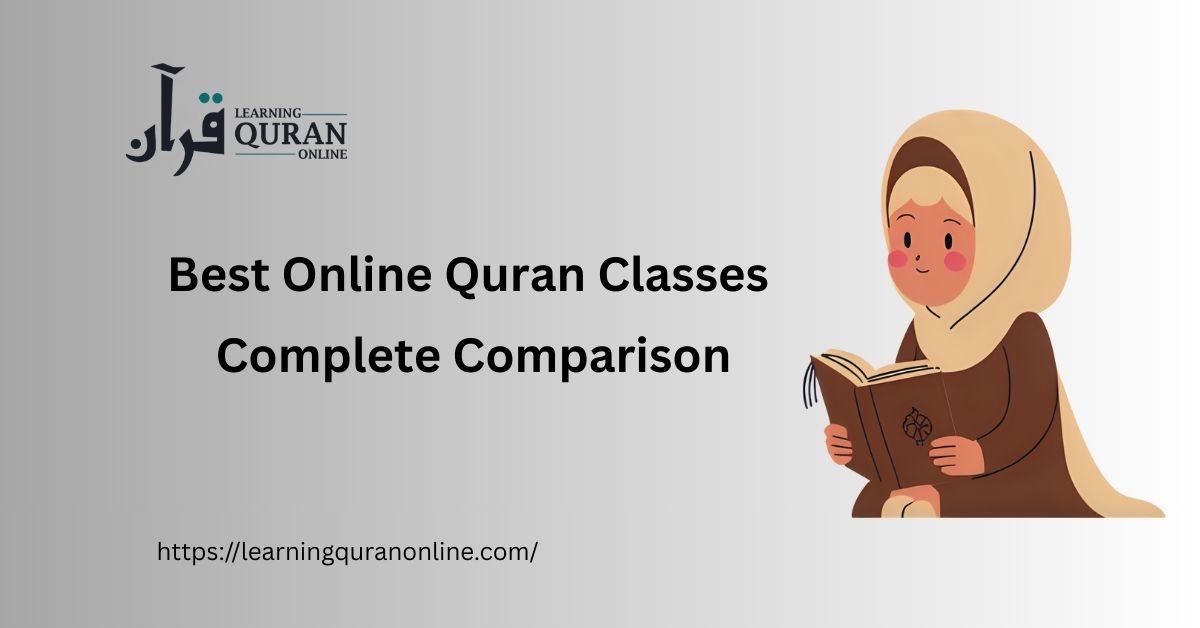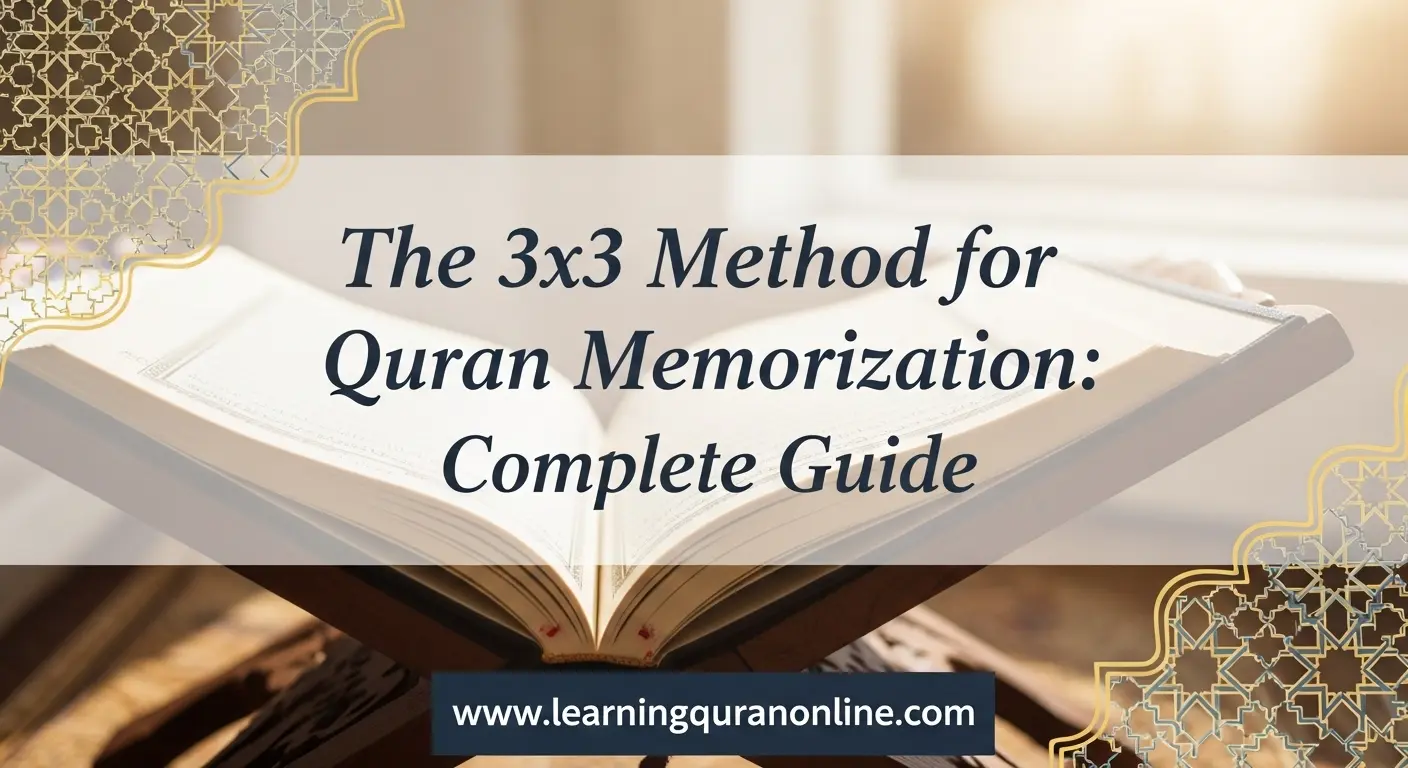Table of Contents
ToggleWhy Choose Online Quran Classes?
Online Quran classes have become the preferred way for learners worldwide to access certified Quran tutors. They offer flexibility, one-on-one attention, and access to native Arabic speakers and qualified teachers no matter where you live. Whether you’re searching for Quran lessons for kids, adults, or complete Hifz programs, virtual Quran academies provide interactive lessons, multimedia resources, and personalized curricula to accelerate learning.
Key Features to Compare
When exploring the best online Quran classes, evaluate these core features:
- Teacher Qualifications: Certified, native Arabic speakers versus general tutors; experience with Tajweed and Hifz.
- Class Format: One-on-one vs group lessons, live online sessions, recorded classes, mobile app support.
- Curriculum: Tajweed rules, Quran recitation, memorization (Hifz), Arabic reading, Tafsir and Islamic studies.
- Teaching Methodology: Interactive whiteboards, Quran reading tools, repetition techniques, practice assignments.
- Scheduling & Flexibility: Time-zone friendly, flexible booking, frequent make-up classes.
- Safety & Privacy: Child protection policies, vetted tutors, secure video platforms.
- Price & Trial: Free trial lessons, transparent pricing, package discounts.
- Reviews & Success Stories: Testimonials, student outcomes, exam or certification options.
Types of Online Quran Classes
Understanding class types helps you match learning goals to the right format:
- One-on-One Quran Classes: Personalized attention, ideal for Tajweed, Hifz, and fast progress. Best for beginners and serious memorization students.
- Group Classes: Cost-effective and social. Good for consistent practice and classroom-like learning for kids.
- Self-Paced Courses: Pre-recorded lessons for learners with irregular schedules who prefer studying at their own pace.
- Hifz Programs: Structured memorization curriculum with daily monitoring and recitation checks.
- Quran & Arabic Combined: Integrated courses teaching Arabic reading, grammar, and vocabulary alongside Quranic studies.
Curriculum & Teaching Methods
A strong curriculum balances classical Tajweed with modern pedagogy. Key curriculum elements include:
- Tajweed rules with practical recitation drills and audio feedback.
- Arabic reading (I’raab basics, script recognition) for non-Arabic speakers.
- Step-by-step Hifz schedule with revision cycles and oral tests.
- Tafsir and memorization techniques for understanding and context.
- Assessment tools: periodic tests, recitation recordings, and certificates.
Top tutors use interactive whiteboards, screen-sharing, and multimedia content to make lessons engaging. Many platforms include homework trackers and progress reports to keep learners accountable.
Teacher Qualifications & Safety
Excellent online Quran teachers usually have formal Islamic education or Ijazah (chain of narration) in Quranic recitation and strong experience in online teaching. When comparing providers, check for:
- Verified credentials and background checks.
- Experience teaching children and adult learners.
- Availability of male and female tutors to honor cultural preferences.
- Clear child protection and privacy policies for young students.
Reputable academies often display teacher profiles, qualifications, and short demo videos so parents and learners can make informed decisions.
Technology & Learning Platform
Technology transforms Quran learning. Key platform features that improve learning outcomes include:
- Live video conferencing with clear audio for recitation feedback.
- Interactive whiteboard for marking Tajweed and pronunciation.
- Recording feature to review past lessons and track improvement.
- Mobile app compatibility and offline resources for practice.
- Homework submission portals and automatic reminders.
Make sure your internet speed and device (tablet, laptop) meet platform requirements for smooth sessions.
Pricing, Trials & Packages
Price ranges vary widely depending on teacher expertise and class format. Typical pricing models include hourly rates, monthly subscriptions, and package discounts for long-term commitments. Consider these tips:
- Take advantage of free trial lessons to evaluate teaching style and platform usability.
- Compare hourly rates for one-on-one vs group sessions; one-on-one is pricier but faster.
- Look for package savings (e.g., 3 to 6 months) and discounts for siblings or referrals.
- Watch for hidden fees like registration or material costs.
How to Choose the Best Online Quran Classes: A Checklist
Use this checklist when evaluating providers:
- Define your goal: Tajweed, Quran recitation, Hifz, Tafsir, or Arabic.
- Decide on class format: private, group, or self-paced.
- Verify tutor qualifications and teaching experience.
- Schedule a trial class and assess lesson structure and interaction.
- Check safety policies, especially for children.
- Compare platform tools: recording, homework, whiteboard.
- Read reviews, testimonials, and look for success stories.
- Confirm pricing transparency and refund/cancellation policies.
Popular Options: Pros & Cons
Rather than naming specific brands, here’s a balanced view of main provider categories:
- Dedicated Online Quran AcademiesPros: Structured curriculum, vetted teachers, certificates, progress tracking. Cons: Slightly higher cost; fixed curriculum may be less flexible for some learners.
- Tutor MarketplacesPros: Wide range of tutors, competitive pricing, flexible booking. Cons: Quality varies; less consistent curriculum and vetting.
- Mobile Apps & Self-Paced CoursesPros: Affordable, flexible, good for beginners or supplementary practice. Cons: Limited live feedback, less personalized correction for Tajweed and Hifz.
Benefits for Children and Adults
Online Quran classes cater to both young learners and adults:
- Kids: Interactive lessons, child-friendly tutors, consistent scheduling, and gamified learning can improve retention and engagement.
- Adults: Flexible scheduling, privacy, and targeted goals like Tajweed perfection, memorization, or understanding Tafsir.
Frequently Asked Questions (FAQs)
How long does it take to learn Tajweed online?
Learning basic Tajweed rules can take a few months with consistent weekly lessons; mastery depends on practice, frequency, and tutor quality.
Can children memorize the Quran online?
Yes. Structured Hifz programs with regular check-ins, revision schedules, and parental involvement work well for children.
Are online Quran teachers certified?
Many are — especially in established academies. Always request teacher bios, certifications (Ijazah), and trial lessons before committing.
Final Recommendation
Finding the best online Quran classes requires balancing your goals, budget, and preferred teaching style. If you want a reputable, structured option with certified teachers and comprehensive tracking, consider an established online Quran academy. If flexibility and budget are priorities, marketplaces and apps can be excellent starting points.
For those who value certified teachers, flexible timings, and a modern learning platform, Learning Quran Online is one example of an academy offering a range of services from Tajweed and Quran recitation to full Hifz programs.
















